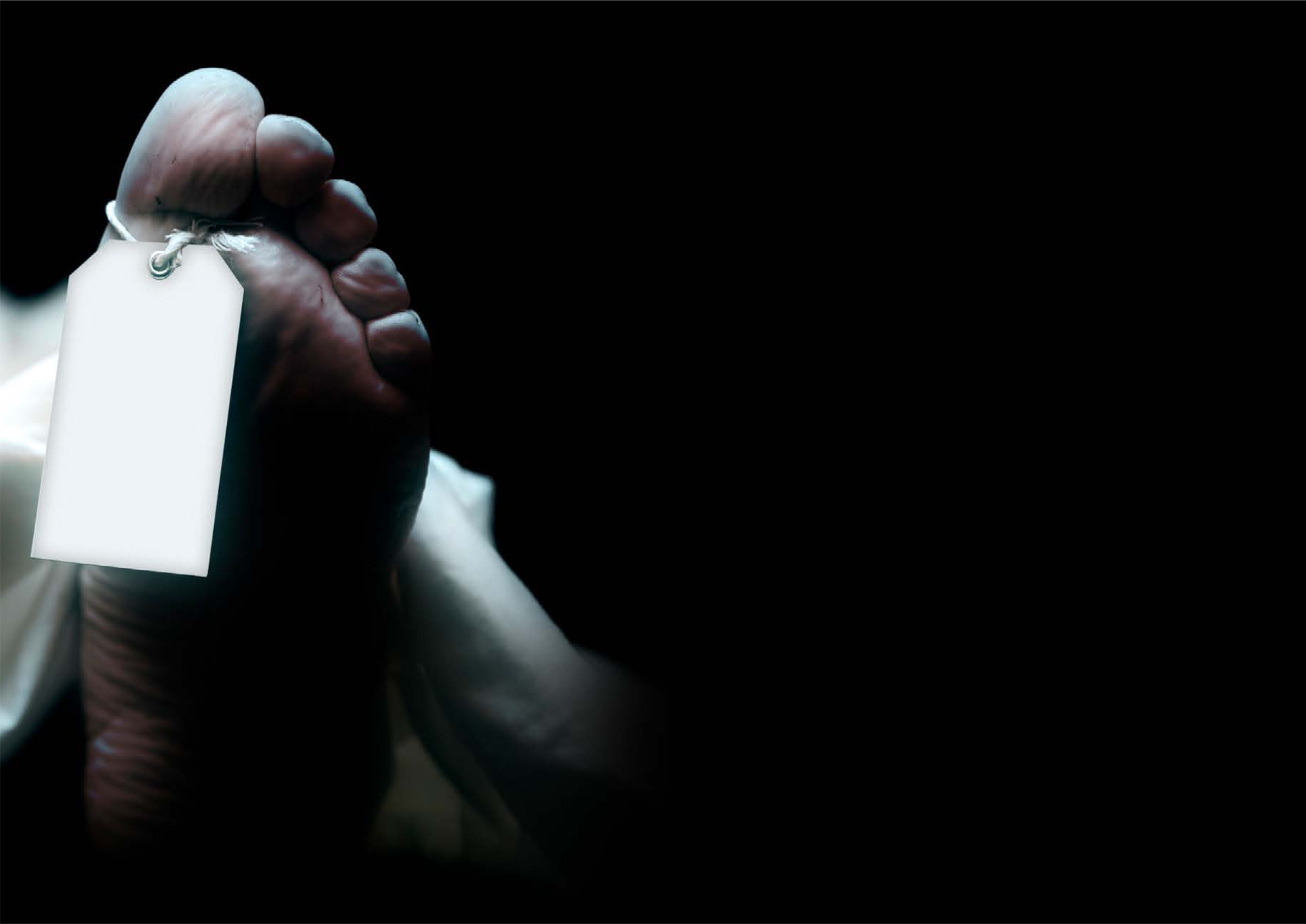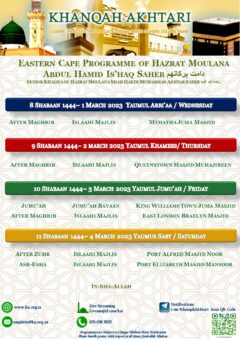In life we have milestones that mark our transition from one phase to another. When we were young it is our school exams, matric and so forth. Often, how we prepare for that landmark determines how well we do in the next phase and what opportunities we have. Our greatest landmark and one that overshadows all others is our expiry date of life, the day we die. How we live prior to it and how we prepare for it will determine the sort of existence we will experience beyond it.
How do we go about preparing for it. Like how we motivate the students towards their matric exams for example we need to be motivating ourselves for the momentous occasion of death. We need to be speaking about it often, create awareness around it, research it, get to know its ins and outs, and do deeds and live a life that will secure a beautiful existence beyond death.
A Long Life
“Do not wish for death because its horror is intense. Good fortune is that one has a long life and Allah Ta’ala gives him the ability to repent.” (Ahmed)
To wish for death due to life becoming difficult is not allowed. If the test becomes very difficult the most one can do is to pray as outlined in the Hadith of Bukhari: “Oh Allah, keep me alive as long as living is best for me, and grant me death if death is better for me.”
The only person who can truly rest after death is the one who is forgiven by Allah Ta’ala and accepted by Him. (Ahmed) And who can have this absolute assurance?
“Happiness, utter happiness is to have a long life in the obedience of Allah Ta’ala.” (Hadith) “A Muslim’s life only increases him in goodness.” (Muslim)
The hadith sums it up, “Do not wish for death because if you are doing good, extra life will only add more goodness to your good actions. And if you happen to be doing the wrong things, then an extension of your life gives you a second chance to repent from your sins.” (Bukhari)
That is why one of the pious old men when asked, “Do you love death?” replied, “No, for my youth and its evil impulses has departed. And old age and its goodness has arrived. When I stand, I say Bismillah and when I sit, I say Alhamdulillah. I love that this excellent state is prolonged.” Another was asked, “What do you have to live for?” He replied, “An opportunity to cry over my sins.”
“There is nothing more virtuous in the Sight of Allah Ta’ala than a Believer who grows old in Islam due to his recitation of Subhanallah, Allahu Akbar and La ilaha illallah.” (Ahmed)
Yes, one may yearn for death once the love for Allah Ta’ala increases. In this instance the person longs to meet Allah Ta’ala. Abu Darda radhiallahu anhu said, “I love death out of a longing to meet my Lord.” A poet says, “A sinner yearns for You, Oh the One who is near, the way a thirsty person yearns for a drink of sweet, cool water.” The condition is that the person’s deeds are in line with the rules of Allah Ta’ala. The Hadith tells us, “No one should wish for death except a person who has confidence in his deeds.”
Preparation
To get a good death one needs to live his life doing such things that he would not mind being found doing when death comes. Abu Hazim rahimahullah said, “Every action which you do not want to be found doing at death, leave it out from your life. It will then not harm you when you die.”
At the end of the day, one may commit all the sins he wishes but where can he run? “Where is the place of refuge and safety when Allah Ta’ala is in pursuit and the sinner is definitely going to be caught?” (Poem) Once we realise the seriousness of our expiry date, we need to urgently start doing good deeds and leave out the bad.
This life can be compared to fasting in the month of Ramadaan. It is a fast from committing the sins that are displeasing to Allah Ta’ala. The celebration of breaking the fast, the day of Eid, is the day we meet Allah Ta’ala.
Once a person makes the necessary preparation and works hard in pleasing Allah Ta’ala then when his body is carried for burial, he will say, “Hurry up with me!” out of anticipation of the rewards that he sees in store. Otherwise, it will be the start of eternal regret with his soul calling out to those carrying his body, “Where are you taking me?”
The pious would express fear over what fate awaited them after death. Ibrahim Nakhai rahimahullah, while on his deathbed, said, “I am awaiting the angel of death, not knowing if he will give me good news of Paradise, or the horrific news of Hell.”
We don’t wish for death, but we certainly work towards the certainty of its coming. Umar radhiallahu anhu said, “Don’t wish for death because you will in any case die. But do ask for wellbeing.” The drink of death cannot be endured except by those who are fearful of Allah Ta’ala, are obedient to Him and are expecting the coming of death. Abu al Atahiya expresses it eloquently, “Oh, death has a drink and what a drink it is! You will definitely have to experience that drink. No one knows what actually goes on in the grave except Allah Ta’ala and the one who is in that tomb.”
The Capital of Life
It is death, our inevitable landmark that we are journeying towards. What remains of our lives is our capital. The remainder of our lives needs to be lived with constant improvement of our connection with Allah Ta’ala. Whoever’s two days are equal with no improvement is defrauded and in loss. Whoever’s today is worse than his yesterday is cursed. And whoever has not striven for increase in his good work is in decrease.
The pious would feel embarrassed if their day ended the same as yesterday. They felt ashamed at missing out on the opportunity to improve.
The poet laments, “Is it not a sign of ruin that nights pass by without me gaining any benefit and yet I continue to count them as part of my life?” No one dies except with a regret. If he was doing good deeds, he regrets that he could not have done more. If he was a sinner, he regrets not getting another chance to repent. (Tirmidhi)
“If an ignorant person wishes to purchase the remainder of your life tell him that what remains of a Muslim’s life is priceless.” (Poem) Take the best of pillows and the most comfortable of beds to lie on. After death you will rest your head on the hard rock of the grave.
Dealing with Setbacks
On this journey of life we will encounter setbacks, slip ups, mistakes and decisions that we regret making. How do we deal with them to ensure that we still have a good chance at succeeding beyond death? The Prophets of Allah Ta’ala were protected from committing any sin but at times they would do something which would be nothing for us but, due to their high status it would be something that they would count as serious. The Noble Quran recounts these occasions and details their response in such instances.
In Surah Saad, Allah Ta’ala recounts such incidents in the lives of Prophets Dawood and Sulaiman alaihimas salaam. “Be patient with what they say. And remember Our servant Dawood, the man of strength. Indeed, he constantly turned to Allah.” (Noble Quran, 38:17) Prophet Dawood alaihis salaam had this quality that he would constantly turn to Allah Ta’ala when he felt he had made some mistake.
This is the secret to overcoming life’s slip ups. We need to turn to Allah Ta’ala without delay every time we slip and repair our connection with Allah Ta’ala. Prophet Dawood alaihis salaam had given some advice when two disputants came to him with a case after only hearing one person’s claim. He immediately realised the error and, 1. Asked Allah Ta’ala for forgiveness, 2. Humbled himself before Allah Ta’ala, and 3. Turned to Allah Ta’ala. In return he got three gifts: 1. He was forgiven, 2. He gained a status of nearness to Allah Ta’ala, and 3. He got an excellent end in Paradise. (Noble Quran, 24-25)
Mistakes don’t mean that we cannot reach the high ranks of Divine acceptance.
Allah Ta’ala describes Prophet Dawood alaihis salaam’s son Prophet Sulaiman alaihis salaam as an excellent slave and great in turning to Allah Ta’ala. (Noble Quran, 38:30)
What we have left of our lives can be used to earn the best of real estates in Paradise. It is an asset which we alone can use to our benefit. The poet exclaims, “I lament over the 50 years of my life that have passed. If I am told that I will live to 100 it would crush me with the realisation that I have already lived half of my life.”
We do not know how much of life we have left. We simply cannot afford to going along merrily with our lives without taking the end of it seriously. We need to work with determination and focus towards earning a better Paradise. Remember death, speak about it often and make it a priority to pass its test successfully.











COMMENTS